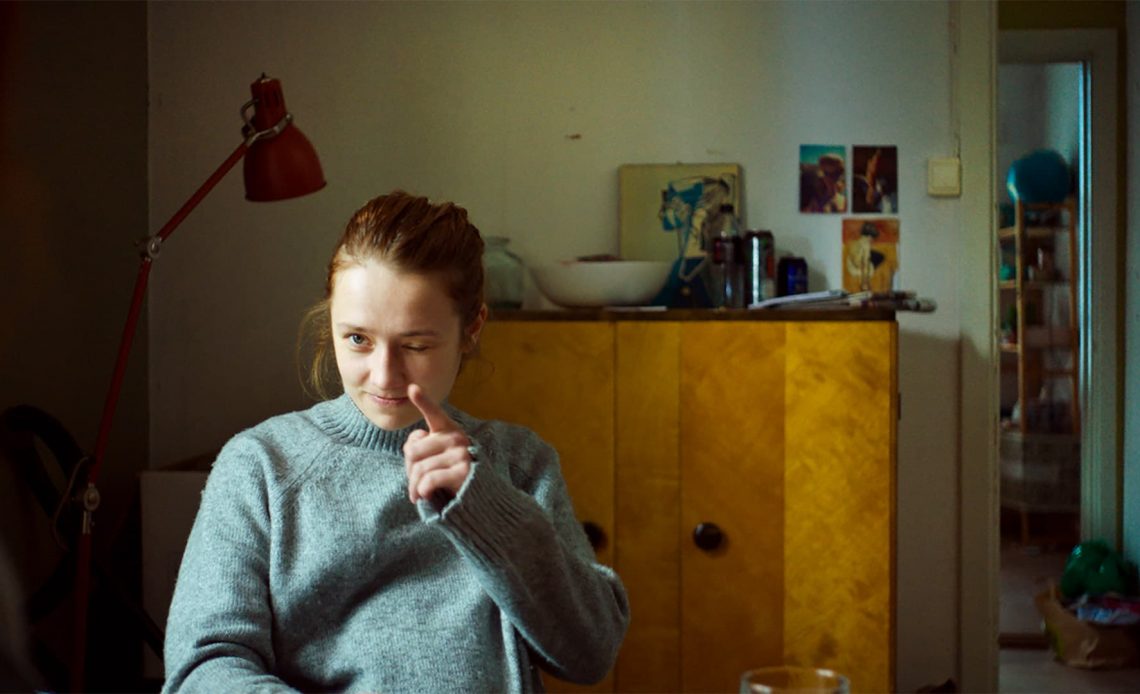There are many films that deal with unwanted pregnancies and the different ways of handling them, but none as inventive as Ninjababy.
A movie like Never Rarely Sometimes Always (2020) is an excellent example of a film that deals with it realistically. But what if we can add a dash of imaginative animation and comedic liberation to a topic like this?
Rakel (Kristine Kujath Thorpe) does not have a pure idea about what she wants to be in the future. She likes to have her hands full with projects, but something happens that will change her life forever; she becomes pregnant after a one-night-stand and only notices six months later, too late to do anything about it. She feels the “ninjababy” in her head and belly, sneaking its way into her reality, and it does not make Rakel’s life easier.

The film plays like a comedy of the late 2000s. The teen pregnancy aspect is reminiscent of Juno (2007), and stylistically it is like a gender-swapped version of Knocked Up (2007). It has some of the same facets and features, but it does not cover much ground thematically; these are stories that we have heard before, but what makes the film shine is the personality and humour. Instead of turning the topic into a gimmick, it finds clever and mirthful ways to deal with this type of life-changing crisis.
Ninjababy has many strengths. The film has a unique style, sly wit, thematic importance, and a sharp script, but its strongest weapon is its lead character in Kristine Kujath Thorpe. She is fantastic, delivering laugh-out-loud lines effortlessly with great energy and eminent physical comedy. Thorpe carries the film at its lowest moments, even making the most constructed moments of the film feel grounded. She’s a rising international star that delivers a charming and charismatic performance that radiates with the film’s warm heart.
The film features some hand-drawn animation that drives the narrative forward. The animation pinpoints important aspects of Rakel’s life. It shows us what she aspires to be in the future, her ups and downs, emotionally and psychologically. It shows us what she feels but can’t express completely. But one animation that escapes from drawing to reality is what she calls her “ninjababy”; the baby in her womb.

That “ninjababy” represents the youthful self of Rakel, the type of person that has demanding responsibilities she’s afraid of, and also the unrefined parts of her personality. There are points in which the “ninjababy” may come forth as a bit annoying at times, though Thorpe and the hilarious script make those scenes stand out. The audience might even question if the film would have been better without the “ninjababy” animation, but it serves to develop Rakel as a character.
Overall, Ninjababy is a touching, hilarious, creative, and energetic film made with care about unwanted pregnancy and the surprises that go with it. There are many films on this topic, though Ninjababy has a different way of dealing with the subject – with charm and flair. The film does not shy away from its unpredictability, allowing Rakel to have a deeper emotional expanse and be uncertain about her decisions and plans. It does not have a flat, happy ending but one that’s bittersweet and perfect in its own way. The ending helps give Rakel the space to find out what she wanted for her life all along.




COMMENTS